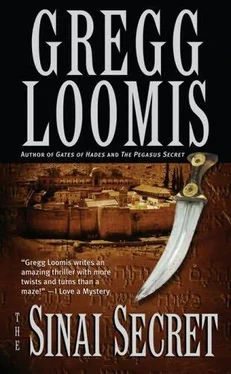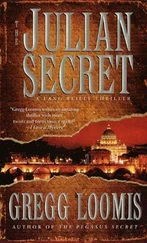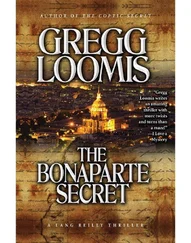Gregg Loomis - The Sinai Secret
Здесь есть возможность читать онлайн «Gregg Loomis - The Sinai Secret» весь текст электронной книги совершенно бесплатно (целиком полную версию без сокращений). В некоторых случаях можно слушать аудио, скачать через торрент в формате fb2 и присутствует краткое содержание. Жанр: Триллер, на английском языке. Описание произведения, (предисловие) а так же отзывы посетителей доступны на портале библиотеки ЛибКат.
- Название:The Sinai Secret
- Автор:
- Жанр:
- Год:неизвестен
- ISBN:нет данных
- Рейтинг книги:5 / 5. Голосов: 1
-
Избранное:Добавить в избранное
- Отзывы:
-
Ваша оценка:
- 100
- 1
- 2
- 3
- 4
- 5
The Sinai Secret: краткое содержание, описание и аннотация
Предлагаем к чтению аннотацию, описание, краткое содержание или предисловие (зависит от того, что написал сам автор книги «The Sinai Secret»). Если вы не нашли необходимую информацию о книге — напишите в комментариях, мы постараемся отыскать её.
The Sinai Secret — читать онлайн бесплатно полную книгу (весь текст) целиком
Ниже представлен текст книги, разбитый по страницам. Система сохранения места последней прочитанной страницы, позволяет с удобством читать онлайн бесплатно книгу «The Sinai Secret», без необходимости каждый раз заново искать на чём Вы остановились. Поставьте закладку, и сможете в любой момент перейти на страницу, на которой закончили чтение.
Интервал:
Закладка:
Bin Hamish snorted sardonically. "After Israel seized the Sinai, bombed the Egyptian air force into oblivion, and destroyed almost all the Egyptian tanks, it was very easy to make peace. Your President Carter could broker the Camp David Accords because Egypt had essentially lost the war and had no means to continue or get its territory back. The Arabs' hatred of Jews, though, continues and will continue as long as one of each is left on this earth."
He paused and swallowed. That is why I am under constant surveillance, also. At any time the government could have me arrested as an agent of a foreign power." He laughed bitterly. "All Jews in Egypt are agents of a foreign power, particularly those whom the government suspects might be useful."
"Useful?"
He was inspecting his hands as though looking for flaws. "Before I was forced to leave the university, I published a number of papers in archeological and scientific journals dealing with ancient and lost sciences."
"So, why not leave? I'd bet one of Israel's schools would love to have you."
"Not that simple," he said dully. "My specialty is ancient Egypt. Once I left, the Egyptians would always find a reason to deny me reentry. Besides, my wife is Arab and has no desire to leave her native land."
The soft footsteps?
"But I stray," bin Hamish said. "We were talking about superconductors."
"I still have a hard time believing such things existed."
Bin Hamish rubbed his chin and got off the stool. "Very well. Please indulge me."
He left the room, the door sighing closed behind him. A minute later he returned, a manila folder in hand. Opening it, he placed several photographs in front of Lang.
At first Lang was uncertain what he was seeing. He recognized the stylized Egyptian figure of a man, face in profile, torso in frontal view. He squinted and picked up the picture.
"It's a photograph of a relief from the temple of Hathor in Dendra, dating back about forty-five hundred years," bin Hamish informed him.
"But what does…?" Lang stopped in midsentence, suddenly aware of what the figure was holding. "Looks like an elongated lightbulb with a snake for the filament."
"Not a lightbulb, a cathode tube."
"Or a vacuum tube."
Bin Hamish was puzzled. "A vacuum tube?"
"As in old radios."
Like Dr. Yadish liked to tinker with.
Lang picked up another picture, this one of several large jars. One had been cut in half vertically. Inside, a rod of some sort had been inserted, held by a stopper.
He held it up. "And this?"
"Look closely, Mr. Reilly. That jar is in the National Museum of Iraq in Baghdad. A copper cylinder was inserted into the neck of a clay jar and fixed with tar or asphalt and topped with lead. In the middle of the cylinder was an iron rod. That particular jar and a number like it have been dated to 1200 or so B. c."
Lang thought a moment. "I was never a science whiz. What's the significance of the jars?"
Bin Hamish spoke slowly, as though addressing a dull child. "A battery, Mr. Reilly. A battery or electric cell."
"But how…?"
"After the Second World War, a man named Willard Gray of General Electric's Pittsfield, Massachusetts, plant built an exact replica of what you see, using nothing more than the material I've described. With only a little citric acid-the acid in, say, a lemon-the jar produced two volts of electricity. If you doubt me, check the April 1957 issue of Science Digest."
There was a knock at the panel that served as a door. Unhurriedly bin Hamish walked over and spoke through a narrow crack. Lang could not make out the words. Shutting the panel again, bin Hamish returned with a tray bearing what looked like the same tea service and bowls.
"A little refreshment?"
This time Lang accepted a small cup of bitter tea while the professor continued. "Those other pictures are of copper utensils from ancient Sumer. They had been electroplated with silver. Then there are more pictures of your 'vacuum tube' at other places."
Lang almost expected his host to next produce Egyptian tomb drawings of a pharaoh watching a TV set, or one of his wives or concubines using a hair dryer. Either the man and those like him were lunatics or the current view of ancient world history needed serious revision.
He was inclined to the latter possibility.
What he had just heard and seen, though, was the stuff of fantasy, Lovecraft, Vonnegut, and H. G. Wells. He could not have been more dumbfounded had Grumps suddenly quoted Shakespeare.
He took a sip of tea and set the cup down. "Assuming all this is true, what is the significance of the Ark being a superconductor?"
"When fueled by orbitally rearranged monatomic elements, such as the pure gold mentioned in your papers-"
Lang held up his hands in surrender. "Try to keep it simple, Professor, something a mere English major might understand."
Bin Hamish thought for a moment. "Simply put, or oversimplifying, actually, once a superconductor is fueled, it keeps on doing whatever task is set for it, sort of a perpetual-motion machine. The way the Ark is constructed is to transport energy over any distance for any length of time. Basically, when fueled by pure gold, the manna of your papers, that energy could well take the form of unimaginable power directed at a specific target."
"Like Jericho."
"Like Jericho."
Lang reached toward the box. "All from a box like-"
"No!" Ben Hamish knocked Lang's hand away. "You would die instantly, like those mentioned in your papers. Let me show you something."
Stepping down from his perch on the stool, bin Hamish placed a rubber mat under his feet. "They had no rubber in biblical times, but the Ark's handlers washed and thoroughly dried their feet, thereby removing moisture or anything else that might act as a conventional conductor. Their clothes would have been of the finest cloth, so as to generate as little static electricity as possible."
He pulled on a pair of rubber gloves and then moved the golden box slightly before walking across the room and opening a cabinet.
He removed a piece of metal and tossed it to Lang. "Slug iron."
Lang looked at the heavy ingot in his hand. "So?"
"Place it at the end of the counter, if you please."
Lang did as instructed.
Bin Hamish returned to stand by Lang and adjusted the box.
What happened next wasn't quite clear. A bolt of light, the brightest Lang had ever seen, seemed to leap from the box and disappear faster than lightning, so fast Lang wasn't sure he had seen it at all. There was no sound. The slug of metal was gone. Not melted, not transformed, but gone without fragments or a wisp of smoke.
"Shit!"
Bin Hamish was peeling off his gloves. "Exactly so."
"But what happened to the metal?"
Bin Hamish shrugged. "There are any number of theories, including transportation to a parallel dimension."
"Yeah, Dr. Shaffer mentioned that. Can you bring it back?"
"So far, no."
Lang inhaled deeply, still not completely sure he wasn't dealing with a madman or a talented trickster. "I'd guess a lot of governments would like to have that in their arsenal."
Bin Hamish chuckled. "What makes you think they do not?" He raised a hand to stifle Lang's next question. "Let me tell you a brief story: In 1976 near Phoenix in the state of Arizona, there was a cotton farmer named David Hudson. In that area, the soil has a high sodium content, a condition Mr. Hudson attempted to lessen with high amounts of sulfuric acid. Do you understand?"
Lang nodded. "Using an acid to dilute a base, right?"
"Just so. Now, after one such treatment, Mr. Hudson Sent soil samples for analysis. When dried by the hot Arizona sun, some particulate in that soil sample would burst into flames and totally disappear. Do I have your attention?"
Читать дальшеИнтервал:
Закладка:
Похожие книги на «The Sinai Secret»
Представляем Вашему вниманию похожие книги на «The Sinai Secret» списком для выбора. Мы отобрали схожую по названию и смыслу литературу в надежде предоставить читателям больше вариантов отыскать новые, интересные, ещё непрочитанные произведения.
Обсуждение, отзывы о книге «The Sinai Secret» и просто собственные мнения читателей. Оставьте ваши комментарии, напишите, что Вы думаете о произведении, его смысле или главных героях. Укажите что конкретно понравилось, а что нет, и почему Вы так считаете.












